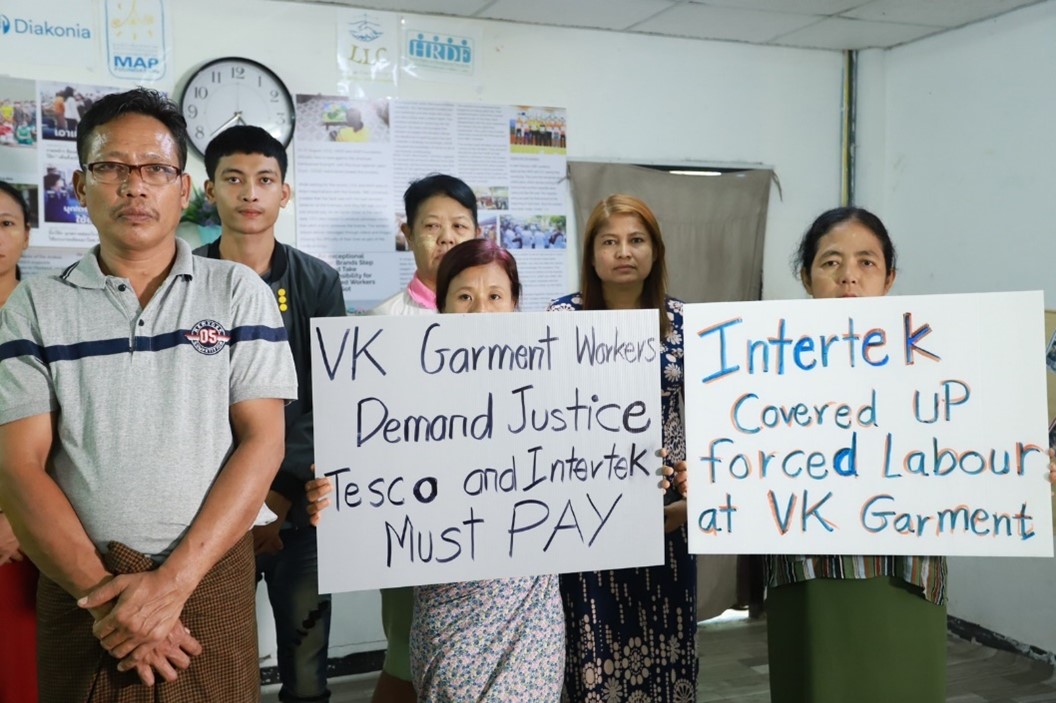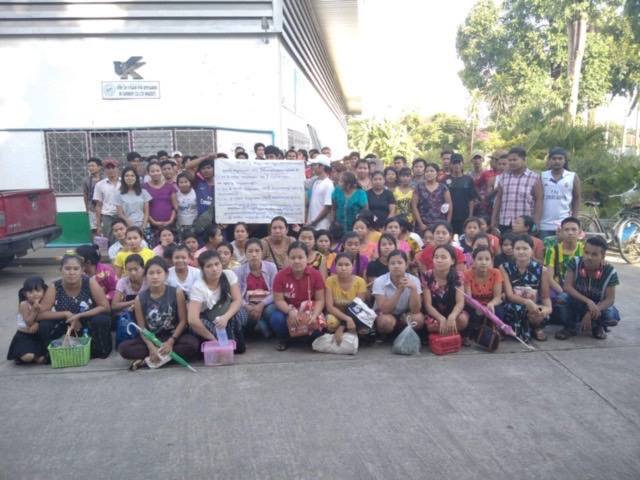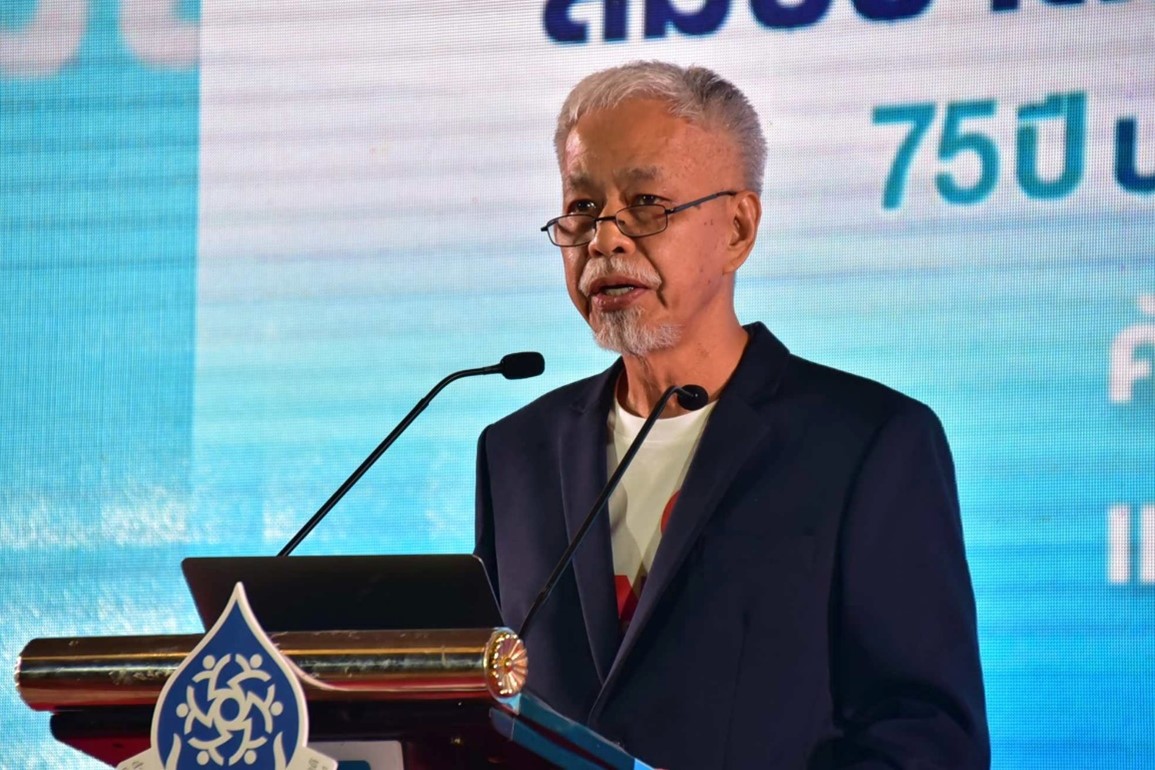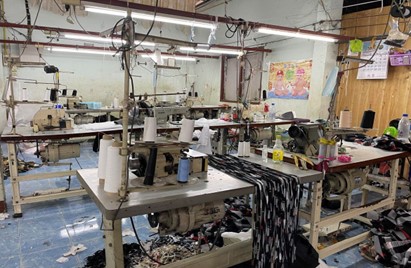136 employees of VK GARMENT in Mae Sot District, Tak. Requesting Supreme Court to rule if Court of Appeal for Specialized Cases’ verdict not compliant with law
Sirirung srisittipisarnpop
Human Rights and Development Foundation (HRDF)
Pursuant to the case filed by 136 migrant employees form Myanmar with legal assistance from the Human Rights and Development Foundation (HRDF) and the MAP Foundation against the employer who owns the VK GARMENT in Mae Sot District, Tak, with the Labour Court Region 6 (trial court) to instruct the employer to provide them with severance pay, overtime pay, holiday pay and others. The Labour Court Region 6 has only held the employer accountable for paying severance pay to the employees while dismissing other requests (Red Case no. R 1030/2565). The employees have later appealed with the Court of Appeal for Specialized Cases and on 1 September 2023, the Court has upheld verdict of the trial court.

On 25 January 2024, the employees have appealed with the Supreme Court since they disagreed with the Court of Appeal which ruled that the investigation process concerning the violations of labour rights by the labour inspector of the Tak Provincial Office of Labour Protection and Welfare in Mae Sot District, Tak, has been carried out properly according to the law. According to the migrant employees, the Court of Appeal’s verdict has failed to uphold justice and adhere to the law on several points as far as the labour inspector’s investigation process and the Labour Court Region 6’s hearing process are concerned. They also disagree with the Court’s refusal to review their challenge on four issues as the Court of Appeal ruled that those issues do not constitute a contestation from legal aspects, and the employees are thus barred from appealing the case.

Chalit Meesit who represents the employees in this case said that the Court of Appeal for Specialized Cases only accepted to review one issue in the appeal motion of the 136 migrant employees including whether or not the labour inspector’s investigation process was in compliance with the investigation procedure and the Labour Protection Act, B.E. 2541? The Court then ruled that the labour inspector in Mae Sot District, Tak, has carried out their duties according to the law in their review of the complaint filed by the employees whose rights have been violated. There were four other issues in the appeal motion which concern key legal issues, but the Court has refused to hear them. The Court of Appeal deemed that the issues raised by the 136 employees in their appeal motion are not concerned with legal issues. Rather, they were deemed by the Court of a challenge or a contestation of evidence taken by the Court which are all about facts and according to the labour procedure code, no appeal motion concerning facts shall be accepted for review.
The key issues the 136 employees disagreed with the Court of Appeal and want to appeal with the Supreme Court include;
- The payment made by VK Garment heard by the Labour Court Region 6 was a piece work pay, did it comply with the Labour Protection Act B.E. 2541’s Section 114 or not?
- The migrant employees have applied to the Labour Court Region 6 to summon the original copy of the pay slips, but the employer had failed to act according to the court’s summon without explaining a reason. But during the witness examination, the employer presented a copy of the pay slips, the evidence of which was considered unlawful, and the Court must review the evidence presented by the employees. Therefore, this appeal motion concerns a question about legal procedure according to the Civil Procedure Code’s Section 123, and does not concern a challenge of facts as ruled by the Court of Appeal.
- According to an audio record of the conversation between the employer and the employees’ leaders, it was clear that no minimum wage was paid since the commencement of the employment as agreed by the parties. The Labour Court Region 6, however, heard and ruled that the even though no pay was made on par with the minimum wage, but the payment was made when the termination of employment was about to be made. Therefore, what was heard and ruled by the Court was not consistent with the evidence presented by the parties.
- Labour Court Region 6 further ruled that even though it was heard that the employer did not pay the minimum wage to the employees, but it happened when the termination of employment was about to be made, but it ruled that if it was true that the pay was not made up to the minimum wage, the employees could have challenged it. Since no challenge and no protest has been lodged, the Court was convinced the payment has been fully made.
- During the hearings, it was heard that the 136 migrant employees had come to work in Thailand thanks to their poverty, inadequate income in Myanmar, and armed conflicts in the country. While working in Mae Sot District, they lived a miserable life and barely had knowledge about Thai language or Thai law. In addition, to get to work in Mae Sot District, they have incurred debt to cover various expenses and fees in both Myanmar and in Thailand. The migrant employees thus lived in a state of fear, worry and accepted any concessions in order to get to work in Thailand. They were, therefore, left powerless. The migrant workers want the Labour Court to take into account such living condition that happens with most workers in Thailand, particularly in Mae Sot District, Tak. Therefore, the examination procedure through the labour inspector and the trial court should be made based on comprehensive facts and an understanding of the miserable situation of the employees and it must be conducted fairly. Therefore, according to evidence in the auditing report based on the business ethics, it appears the pay slips were made in three or four different formats, and there was some manipulation of the employees prior to the auditing procedure based on business ethics, and there was an illegal act made regarding the minimum wage pay, overtime pay and piece work pay slips and there have been someone else in the factory who inserted timestamp cards on behalf of the employees. Both the labour inspector and the Labour Court Region 6 should have conducted a stringent examination according to the jurisprudence adopted in the hearing of labour dispute in order to acquire the most authentic and accurate facts and evidence to ensure a fair trial. The verdicts insofar by the labour inspector, the Labour Court Region 6 (Nakhon Sawan), and the Court of Appeal for Specialized Cases have still failed to establish truth in this case and to ensure fair enforcement of the law for justice of the migrant workers who belong to a vulnerable or precarious group. After all, the case filed only concerned fundamental rights provided for by the Labour Protection Act B.E. 2541. While businesses keep expanding their employment in Mae Sot District, there have been numerous reports of complicated and improper recruitment process.
The perspective on unequal footing between the employer and the employees is an issue that warrants a review through the judicial process in Thailand’s Labour Court in the case of employees of VK GARMENT
“In my opinion, even though the Labour Court has associate judges recruited from the employers and the employees, but several of them do not understand labour issues. They have thus failed to establish truth in several cases which are complicated, particularly in cases where the employees are migrant workers, a marginalized group. Given the lack of knowledge and understanding and being subject to the power of the employer, the employees dare not challenge or speak truth when the labour inspectors were examining the factories. It is a systemic problem of the Thai labour unions and there is no representation of the employees in the associate judges. And even though the Labour Court adopts an inquisitorial system, but in several cases, the Court simply adhere to the evidence from the labour inspector. Therefore, we have to address these structural problems and the whole labour procedure code has to be overhauled to ensure the Court helps to establish the truth” said Somchai Homlaor.

Somchai Homlaor, Chair of the Human Rights and Development Foundation (HRDF) made his comment on three points;
(1) Based on the Thai labour jurisprudence, a business enterprise belongs exclusively to the employer. Therefore, its operation and management fall entirely under the purview of the employer. But in reality, there are different other concepts, for example, according to socialism, in a business enterprise, the employees are treated as a partner. Therefore, to ensure justice, one also has to take into account the decent work and life of the employees as well.
(2) The relationships between employer and employee are unequal. And if it is supposed that the management power belongs exclusively to an employer, the employee is only considered a lackey and is subject to whatever exploitation made by the employer, particularly an employee belonging to a marginalized group, such as children, women, unskilled labour, and migrant workers. And if the workers do not band together as a union, they barely have any power to bargain with the employer. Therefore, the Labour Court should aim to protect workers belonging to a marginalized group. According to the International Labour Organization (ILO), the so called “labour protection law” is not equal to a general civil law. A labour protection law is a law that protects workers who are the weaker parties in society and it could otherwise be called a social law. It aims to provide protection to vulnerable groups of people including consumers, minorities, ethnic people and workers, particularly migrant workers. If the law enforcement officials and the Court do not understand this concept, it is difficult for migrant workers to have justice.
(3) The employees, particularly migrant workers, are often subject to the dominating power of the employer. They belong to a vulnerable group and stay beyond the protection of the law. All of their important documents are retained by their employer. When getting into a legal dispute, it is challenging for the employees to present their evidence to the authorities or the Court since every document has been withheld by the employer. And the employer can tamper with the evidence as they so desire. According to the labour protection law, the employer is required to keep the time sheet, pay slips, etc., while the employees do not have access to such documentation. If the employer does not allow them to see, the employees would not have access to them.
Therefore, according to the labour procedure law, a Labour Court has to be a Specialized Court. The Court is supposed to have the understanding about labour, and at least must understand threes aforementioned issues. The Court is also required to conduct its hearing based on the inquisitorial system whereby the Court has to establish the truth by themselves, particularly the Labour Court which is a trial court. When conducting a hearing, the Court has power to summon any oral and documentary evidence. The trial court, therefore, has to comprehensively explore the truth, to establish it beyond any doubt until no argument is left. Since at the levels of the Court of Appeal and the Supreme Court, there shall be no hearing on factual arguments, therefore, if the trial court fails to establish the truth, and simply accepts the investigation of the labour inspector as the indisputable truth, regardless of the arguments that the labour inspector’s examination procedure was flawed, the migrant workers would not receive justice.
The understanding about labour issues of the Court is therefore an issue that warrants our attention and it is related to a systemic problem. Since a Labour Court is a specialized court, its judges should therefore have the expertise on labour issues and have the strong skills to conduct the hearing based on the inquisitorial system inquisitorial system. Judges in the Labour Court have transferred from judges in the Court of Justice. They may only be familiar with a criminal or civil case. Therefore, before doing their work in the Labour Court. They should receive training on labour law. They probably have no understanding of labour law as a social law and may not understand labour issues, particularly the issues of workers belonging to vulnerable groups such as migrant workers. They, therefore, lack the skills to conduct the hearing based on the inquisitorial system when hearing a labour case. Moreover, most judges in the Labour Court only stay in their offices for a few years, and then get transferred to other courts. Even though a labour division has been established in both the Court of Appeal and the Supreme Court with judges coming from those who used to work at the Lower Labour Court. Despite having more knowledge and expertise, but at the two Courts of higher instances, they are not supposed to rule on facts of the cases.
Background of the VK case in the Thai Labour Court which end up in the British Court
The case happened in October 2020, when 136 migrant workers employed by VK Garment Co., Ltd., based in Mae Sot District, Tak, have filed a complaint with the labour inspector in the Tak Provincial Office of Labour Protection and Welfare at its chapter in Mae Sot District, to demand the payment of their minimum wage, overtime pay, and holiday pay retrospectively to two years and their severance pay and notice pay. Altogether, the 136 workers demanded about 34 million baht. After receiving the complaint and its review, the labour inspector in the Tak Provincial Office of Labour Protection and Welfare at its chapter in Mae Sot District, issued an order of labour inspector no. 40/2563 dated 30 December 2020 for the employer who owned VK Garment to pay around 3.6 million baht as severance pay and 1.6 million baht as special severance pay in lieu of advance notice. The employees found the amounts awarded to them were unfair.
As the 136 employees did not agree with the amount of severance pay and notice pay according to the assessment of the labour inspector, they have filed the case with the Labour Court Region 6 to have the labour inspector’s order rescinded. It turned out the employer, or VK Garment, was not willing to provide such severance pay and notice pay to the employees, they have also applied to the Court to have the labour inspector’s order rescinded as well. As the case had been filed before the case of the employees, the migrant employees applied to the Court to be a third-party (an interpleader) in the case filed by their employer, the VK Garment, against the labour inspector in the Tak Provincial Office of Labour Protection and Welfare at its chapter in Mae Sot District.
Later on 15 September 2022, the Labour Court Region 6 ruled that the employer must pay an additional amount of around 1.6 million baht since the employees managed to present their evidence concerning their duration of employment during the witness examination. This time, the employees concurred with the Labour Court Region 6’s verdict on the payment of severance pay and notice pay, and they did not want to pursue the case on this point. (Red Case no. R 1030/2565, dated 15 September 2022.) The 136 employees, however, did not agree with issues concerning other pays, the pay slips, and the investigation process carried out by the labour inspector which failed to adhere to the legal procedure and was unable to acquire all evidence and facts. Following the trial court’s verdict, the 136 employees have appealed on those issues. And the Court of Appeal for Specialized Cases has ruled that the investigation carried out by the labour inspector complied with the investigation procedural law of labour inspector according to the Labour Protection Act B.E. 2541. There has, however, been a lack of transparency in the labour inspector’s investigation, and key evidence emerged to indicate that VK Garment had violated labour rights including on minimum wage, overtime pay, and holiday pay since the payment records failed to comply with the requirements of the Labour Protection Act B.E. 2541’s Section 114 and witness hearing law according to the Civil Procedure Code’s Section 123.
The 136 employees who are migrant workers therefore have sought permission and filed the case with the Supreme Court pursuant to the Civil Procedure Code’s Section 249 asking the Court to examine the investigation and hearing process of the labour case from the labour inspector through to the Court of Appeal and to adjudicate on legal arguments concerning the treatment of the business enterprise and the migrant workers as the last judicial recourse. The 136 migrant employees look forward to have their fundamental rights recognized pursuant to the Labour Protection Act B.E. 2541 and to receiving justice from the labour judicial procedure.
The employees filing case with British court for alleged forced labour perpetrated by VK GARMENT as supplier of brand name clothing for TESCO

In 2022, The Guardian published a report on the litigation against Tesco for the alleged forced labour to manufacture F&F jeans in Mae Sot District, Tak (Workers in Thailand who made F&F jeans for Tesco ‘trapped in effective forced labour’, published on Sunday 18 Dec 2022.) The case has been brought by the 136 migrant employees to the British court represented by the Leigh Day law firm against concerned companies including VK Garment, Tesco PLC), Ek-Chai Distribution System Company Limited (which had been the Thai branch of Tesco’s business, until it was sold to Charoen Pokphand Group in 2020), and the auditors, Intertek, for the alleged violation of human rights and labour rights in VK GARMENT Factory. It was alleged that the 136 Myanmar migrant employees had been subject to force labour in various forms including working 99-hour weeks for illegally low pay to supply the global brands base don the interviews of 21 Myanmar migrant employees as follows;
- Most workers are paid as little as £3 a day to work from 8am to 11pm with just one day off a month.
- Detailed records kept by supervisors show the majority of workers on their lines were paid less than 180 baht (£4) a day which was lower than the Thai minimum wage.
- The Myanmar migrant employees have to work through the night for 24 hours at least once a month to fulfil large orders of supply chain, and become so exhausted they fall asleep at their sewing tables.
- Some reported serious injuries from industrial sewing machine including having one’s index finder tip severed after slicing it in a button machine while making F&F denim jackets.
- Many migrant workers said they were shouted at and threatened by managers within the factory if they did not keep working overtime and meet targets.
- More than a dozen of the workers interviewed said the factory opened bank accounts for them and then confiscated the cards and passwords so they could make it appear they were paid minimum wage while paying much less in cash.
- Most workers relied on VKG for their immigration status and some said their immigration documents were held by the factory, leaving them in debt bondage.
- Factory accommodation within the compound consisted of overcrowded rooms with concrete floors to sleep on and dirty pond water in a bucket to wash. Workers say most rooms had no door, just a curtain.
Therefore, the litigations in Thailand and abroad are a key testament to the brevity of the employees who have stood up to demand their rights from their employer after having their rights violated through a judicial process and it aims at holding concerned companies legally liable. Even though the litigations have affected the livelihood of the 136 migrant employees who have to live a miserable life in Thailand, but they have chosen the path to fight because they want to prove that all the employees are aware of their rights and no longer allow their violations to go unpunished. This is the key reason that drives their legal actions.
References
